Iranian Foreign Minister Denies Intent To Expand Regional War
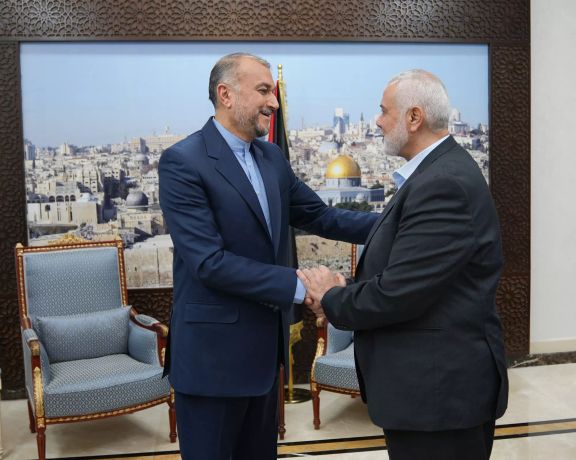
Iran's foreign minister continued to deny Tehran's goal to expand war in the region on the back of the Gaza war while simultaneously meeting heads of Iran-backed Hamas and Hezbollah.

Iran's foreign minister continued to deny Tehran's goal to expand war in the region on the back of the Gaza war while simultaneously meeting heads of Iran-backed Hamas and Hezbollah.
In a meeting with Lebanese Prime Minister Najib Mikati, Iranian Foreign Minister Hossein Amir-Abdollahian said “if Iran were pursuing such a goal, it would lead to a significant change in the overall conditions in the region.”
However, the foreign minister traveled to Beirut for discussions on the situation in Gaza with Iran's largest proxy, Lebanese Hezbollah Secretary-General Hassan Nasrallah as well as Palestinian Islamic Jihad Secretary General Ziad al-Nakhalah and Hamas' Khalil al-Hayya on Thursday.
The leadership in Tehran has had multiple meetings during the course of this year with heads of its proxies in the lead up to the Hamas invasion of Israel on October 7, in which 1,200 mostly civilians were murdered and 240 taken hostage to Gaza.
Israel's relentless retaliation has seen the worst bloodshed since Hamas took over the strip in 2007, vowing to take out the proscribed terror group once the hostages have been returned.
Iran has consistently made similar statements in the past four weeks while expressing support for Hamas and celebrating the attacks across Iran. Since October 7, Iran's proxies across the region have targeted Israel, from Iraq, Syria, Yemen and Lebanon, making it ever more difficult for Tehran to deny its involvement in a conflict which has claimed thousands of lives.

An Iranian MP expressed deep concern over the impact of soaring inflation on the nutritional well-being of the nation, particularly affecting children and pregnant women.
“Inflation, especially in the context of rising prices, is hindering the youth and prospective mothers from providing proper nutrition, posing a potential threat to the country's future. The nutritional crisis, marked by the absence of essential elements like proteins, meat, and carbohydrates, puts the next generation at risk,” Asghar Salimi warned.
Highlighting the potential ramifications for the country's future, Salimi emphasized the need to guarantee minimum standards of living by understanding the essential nature of food items and their daily requirements.
Moreover, Salimi highlighted the challenges faced by the Iranian population in affording staple foods, particularly fish. With exceptionally high prices, the accessibility of fish has become a luxury, extending to red and white meat, which has vanished from many households. The representative expressed doubts about the ability of many people to afford meat for their families on a monthly basis.
Earlier this month, economic website EcoIran reported that the inflation rate in the country has surged to its highest level in the past 22 months, reaching 54.8% for the month of Mehr (ended October 22). However, the CBI rejected the figure, insisting that the inflation rate is approximately 45%, citing discrepancies in calculations.
The economic turmoil is further exacerbated by a 12-fold depreciation of the currency since 2018, following the US withdrawal from the JCPOA nuclear accord and the imposition of sanctions. The Iranian rial has lost about 80% of its value compared to mid-2021 and nearly 50% since December 2021.
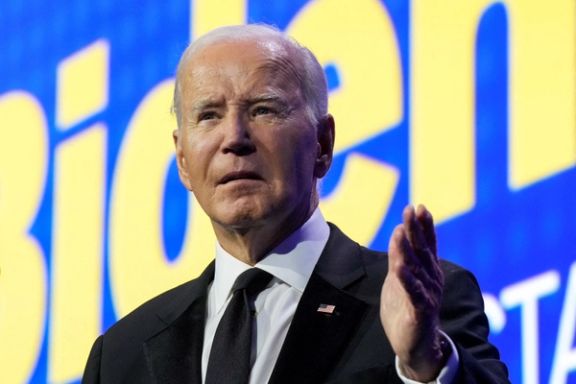
In a letter addressed to the House of Representatives and the Senate, President Joe Biden detailed recent US military actions against the Revolutionary Guard in Iraq and Syria.
The president highlighted the 66 attacks carried out by militia groups affiliated with the IRGC against US personnel and facilities in the region, causing injuries and placing lives at risk. The uptick followed the outbreak of the war in Gaza, in which the US quickly stated its backing of Israel's right to defend itself following the Iran-backed invasion of October 7, the single most deadly day for Jews since the Holocaust.
Biden stated that on October 27, November 10, and November 14, Washington conducted targeted strikes against facilities in Syria used by the IRGC and its affiliated groups.
"The strikes were taken to deter future attacks and were conducted in a manner designed to limit the risk of escalation and avoid civilian casualties. I directed the strikes to protect and defend our personnel conducting military operations pursuant to the 2001 Authorization for Use of Military Force," explained President Biden.
Iran has denied direct involvement in the Gaza conflict, but its proxy forces in Lebanon, Syria, Iraq and Yemen, have initiated attacks against both Israel and US forces.
The attacks by Iran-affiliated groups have resulted in at least 62 US personnel sustaining minor injuries or traumatic brain injuries.
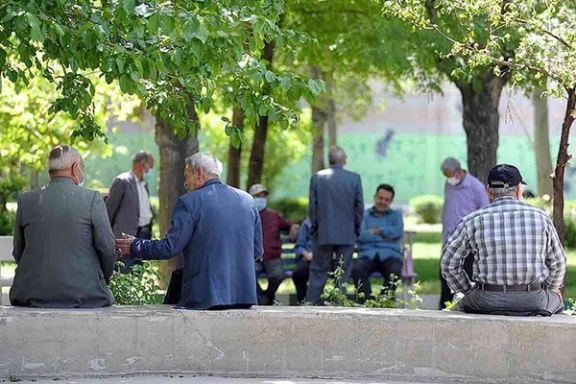
Iran's Islamic labor unions have urged the cancellation of a new law to increase the retirement age and required years of service to qualify for a full pension.
Iranian lawmakers on Sunday approved legislation that increases the retirement age for men by two years to 62, if they start working at age 20 and pay social security taxes for 42 years. Age of retirement for women has not been altered by the new law and remains 55.
In a statement Tuesday, the coordinating body of the Islamic Labor Councils called the new legislation, which is a part of the seventh development plan law, a severe blow to workers.
The Constitution of 1979 recognizes workers’ right to form unions, but the Islamic government has always been very intolerant of independent unions. In 1985 the parliament passed a law that endorsed Islamic labor councils as an alternative to unions which the government has always tried to bring under its control.
The new legislation has also increased the number of years in employment to qualify for a full pension.
Those who enter employment after the final approval of the new law will have to work for over 42 years to qualify for a full pension, while those currently working will have incremental increases to their required work years.
A person who enters the workforce at the age of 30 after the final of approval of this law, for instance, will have to work until the age of 72 years to benefit from a full pension.
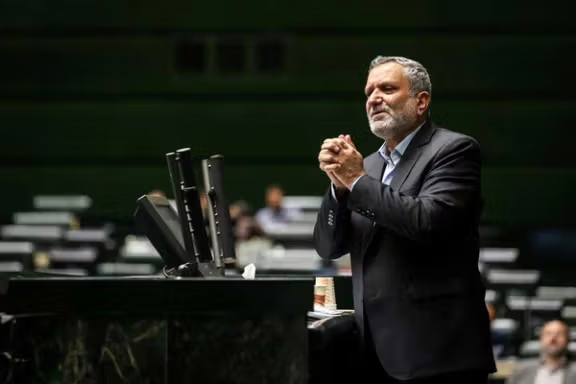
Amid economic hardship and a 50-percent annual inflation rate, it is not just the unions who object to the law, but also the public in general, who see the government move as yet another tactic to force ordinary Iranians to pay for its inefficiency and corruption.
The legislation, which like other laws approved by the parliament has yet to be reviewed and approved by the constitutional Guardian Council, has been very strongly criticized by many including some of the lawmakers.
On Tuesday, Minister of Labor Solat Mortazavi acknowledged that the decision to increase the retirement age and qualification for full pension is primarily aimed at addressing the financial challenges faced by retirement funds. The looming insolvency of many of these funds poses a significant challenge to the government. Mortazavi emphasized that such measures are essential to stabilize the funds, preventing their complete insolvency in the near future.
Iran's Civil Servants Pension Fund (CSPF) is the largest fund in the country after the Social Security Organization with over 1.7 million members.
Critics blame mismanagement and corruption for the several-year-long crisis in pension funds.
In April 2022, for instance, Hossein Amerian, the newly appointed director of the governmental steel industry pension fund, said the fund had incurred a loss of around $400m through mismanagement and embezzlement of former officials of the fund.
The Steel Industry Pension Fund pays the pensions of tens of thousands of workers of government-owned and privatized steel companies.
The Social Security Organization, a non-governmental organization that provides health insurance, pension, and unemployment benefits to millions of members who work for the private sector or are self-employed, has similarly been in crisis for years. The organization covers more than 73 percent of the Iranian population.
Successive governments have driven the Social Security to insolvency by massive borrowings to make up for budget deficits, while Iran sits on one of the world’s largest oil and natural gas deposits.
The government is responsible for contributing of three percent of insurance premiums to the social security fund. However, in October, an official of the organization’s Pension Fund said the government currently owes $ 15 billion to the organization.

The United States has intercepted and shot down several one-way attack drones launched by Iran-backed Yemeni Houthis on Thursday morning.
The US Central Command (CENTCOM) announced in a post on X that the attack was repelled by the USS Thomas Hudner, an Arleigh Burke-class guided missile destroyer.
“The drones were shot down while the US warship was on patrol in the Red Sea,” added the report.
According to CENTCOM, “the ship and crew sustained no damage or injury.”
The attack came hours after the Israeli Defense Forces (IDF) shot down a cruise missile over the Red Sea before it could infiltrate into the Israeli territory.
The missile, which targeted Israel’s southernmost city of Eilat, was believed to have been launched by Yemen’s Houthis, The Times of Israel reported.
On November 15, the Hudner engaged another drone that originated from Yemen. The US Defense Department said in a statement regarding the attack that the drone “was heading in the direction of the ship.”
Since Hamas’s deadly onslaught on Israel on October 7, Yemen’s Houthis, backed by the Iranian regime, have launched several drone and missile attacks against US and Israeli targets in the region.
The Israeli military said on Sunday that Yemen's Houthis had seized a cargo ship in the southern Red Sea as it was sailing from Turkey to India.
The Israeli Prime Minister's Office issued a statement after the hijacking of the ship, calling it “an act of Iranian terrorism.”
Though the Islamic Republic has avoided any direct involvement in the Israel-Hamas conflict, the regime has used its proxy groups in the region such as Houthis and Hezbollah to attack Israel and American targets.
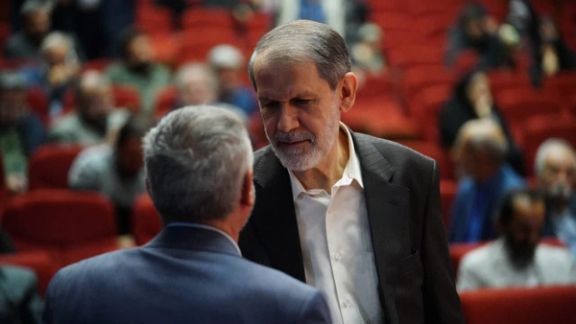
A cleric, once recognized as former populist President Mahmoud Ahmadinejad's exorcist, has raised questions about the income sources of a wealthy financier of hardliners.
In an interview with Khabar Online, Abbas Amirifar stated that Sadeq Mahsouli, the leader of the ultraconservative Paydari party that dominates the Iranian parliament, with several members serving as President Ebrahim Raisi's ministers, must disclose his income sources and the extent of his wealth to the public.
Earlier, conservative political commentator and a former editor of the Kayhan newspaper had also said that Mahsouli should be transparent about the source of his income and tell the nation how he became a super capitalist.
Mahsuli was an aide to Ahmadinejad in the 1990s when he was the governor of Ardabil province. Later, he became his interior minister when Ahmadinejad rose to power as Iran's President in the 2000s.
Mahsouli currently advocates for a political purification campaign launched by his peers, seeking to consolidate all political power within the ranks of the Paydari Party. The campaign has gone much further than just the government, with hundreds of university professors, teachers and artists fired or banned from working.
Hesameddin Ashna, an adviser to former President Hassan Rouhani, has wryly remarked that the present government in Iran is a result of "Mahsoulicracy."
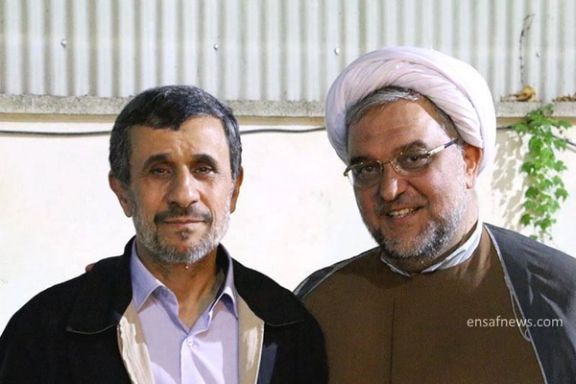
In an interview with Khabar Online, the cleric Amirifar said that the party would not have survived without financial support from Mahsouli's holdings. He added that Paydari was a legitimate political organization when its founding father Ayatollah Mesbah Yazdi was alive, but after his death the party lost its legitimacy. He opined that if Mesbah Yazdi was alive, he would have opposed Mahsouli's position in the party.
Amirifar argued that Mahsouli is not a popular political figure and if he ever becomes a candidate for any post, he is unlikely to win the people's vote. However, he insisted that individuals close to Mahsouli run rich entities including the Social Security Organization and the Ministry of Welfare.
While many believe that Mahsouli is a front for Morteza Aqa Tehrani who cannot be the party's leader because of his reputation as a cleric who has a US permanent residency or possibly citizenship, Amirifar said that Mahsouli hides behind Aqa Tehrani to conceal his vast financial resources.
Moreover, Mahsouli's inclusion in the Ahmadinejad Administration tarnished the former President's reputation, as Mahsouli's wealth and financial dealings contradicted Ahmadinejad's professed commitment to social justice. Amirifar noted that Ahmadinejad realized too late that Mahsouli's role in the government was counterproductive.
Mahsouli, a former IRGC general during the Iran-Iraq war of the 1980s, was Ahmadinejad's classmate at the university and his access to vast financial resources first became controversial when the parliament found it hard to endorse his qualifications as Interior Minister, although he finally won the vote of confidence with a narrow margin. He was named as one of the top 10 wealthiest people in Iran 15 years ago.
In his early career in the government, he was close to current aide of Supreme Leader Ali Khamenei, Parviz Fattah, and current Energy Minister Ali Akbar Mehrabian and several other ultraconservative politicians around Ahmadinejad.
When he wanted to become Ahmadinejad's Oil Minister in the 2000s, he was forced to withdraw his candidacy for the post as an investigation into his sources of income went badly controversial. He finally managed to become Ahmadinejad’s interior minister by just one vote in the parliament.